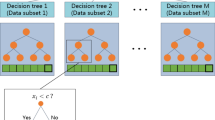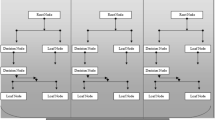Abstract
Rapid and accurate estimation of rock strength is of great practical significance for the stability of rock engineering. This article is based on the results of triaxial compression tests on crack rocks and comprehensively considers the interrelationships between crack geometric characteristics, confining pressure, and physical and mechanical parameters. A database of rock strength characteristic parameters from an experimental perspective is constructed, and a quantitative prediction model for the strength of crack rock masses under the influence of multiple characteristic parameters is established using the random forest algorithm. The results show that the accuracy of predicting rock strength in categories 2 of 21–30 MPa, 3 of 31–40 MPa, 4 of 41–50 MPa, and 5 of 51–60 MPa is 100%, and the accuracy of predicting rock strength in categories 1 of 11–20 MPa is 82% and in categories 0 of 0–10 MPa is 74%; through the study of parameter correlation and quantitative analysis with strength, the selected parameters are reliable and have a certain degree of correlation, and the influence mechanism of characteristic parameters on rock strength has been explored; the calculation results of parameter classification show that confining pressure and crack length are the key factors affecting rock strength. The importance of other parameters is ranked in the order of longitudinal wave velocity > Poisson’s ratio > saturated water content > porosity > saturated quality > dry quality > saturated density > crack dip angle > crack number > crack penetration. This provides an effective approach to consider the randomness and correlation of rock strength parameters, providing a new idea for rock mechanics research.

















Similar content being viewed by others
References
Afrasiabian B, Eftekhari M (2022) Prediction of mode I fracture toughness of rock using linear multiple regression and gene expression programming. J Rock Mech Geotech 14:1421–1432. https://doi.org/10.1016/j.jrmge.2022.03.008
Asadizadeh M, Khosravi S, Karimi J, Sherizadeh T, Vajedian S, Hossaini MF (2022) Mechanical behavior of single-flawed cylindrical specimens subjected to axial loading: a numerical investigation. B Eng Geol Environ 81(10):442. https://doi.org/10.1007/s10064-022-02940-4
Baud P, Wong TF, Zhu W (2014) Effects of porosity and crack density on the compressive strength of rocks. Int J Rock Mech Min 67:202–211. https://doi.org/10.1016/j.ijrmms.2013.08.031
Breiman L (2001) Random forests. Mach Learn 45(1):5–32
Dehestani A, Kazemi F, Abdi R, Nitka M (2022) Prediction of fracture toughness in fibre reinforced concrete, mortar, and rocks using various machine learning techniques. Eng Fract Mech 276:108914. https://doi.org/10.1016/j.engfracmech.2022.108914
Dong ZJ, Yang SQ, Sun BW, Tian WL, Huang YH (2022) Three-dimensional grain-based model study on triaxial mechanical behavior and fracturing mechanism of granite containing a single fissure. Theor Appl Fract Mech 122:103602. https://doi.org/10.1016/j.tafmec.2022.103602
Dyskin AV, Sahouryeh E, Jewell RJ, Joer H, Ustinov KB (2003) Influence of shape and locations of initial 3-D cracks on their growth in uniaxial compression. Eng Fract Mech 70:2115–2136. https://doi.org/10.1016/S0013-7944(02)00240-0
Farooq F, Nasir AM, Khan K, Rehan SM, Faisal JM, Aslam F, Alyousef R (2020) A comparative study of Random Forest and Genetic Engineering Programming for the prediction of compressive strength of high strength concrete (HSC). Appl Sci 10(20):7330. https://doi.org/10.3390/app10207330
Gao H, Zhai Y, Wang TN et al (2022) Compressive mechanical properties and strength prediction model of concrete-granite combined body under active confining pressure. Rock Soil Mech 43(11):2983–2992. https://doi.org/10.16285/j.rsm.2021.2156
Gong CG, Wang W, Shao JF, Wang RB, Feng XW (2021) Effect of water chemical corrosion on mechanical properties and failure modes of pre-fissured sandstone under uniaxial compression. Acta Geotech 16(4):1083–1099. https://doi.org/10.1007/s11440-020-01071-y
Han Q, Gui C, Xu J, Lacidogna G (2019) A generalized method to predict the compressive strength of high-performance concrete by improved random forest algorithm. Constr Build Mater 226:734–742. https://doi.org/10.1016/j.conbuildmat.2019.07.315
He M, Zhang Z, Ren J, Huan J, Li G, Chen Y, Li N (2019) Deep convolutional neural network for fast determination of the rock strength parameters using drilling data. Int J Rock Mech Min 123:104084. https://doi.org/10.1016/j.ijrmms.2019.104084
Hoek E, Martin CD (2014) Fracture initiation and propagation in intact rock - a review. J Rock Mech Geotech 6(4):287–300. https://doi.org/10.1016/j.jrmge.2014.06.001
Hu X, Shentu J, Xie N, Huang Y, Lei G, Hu H, Guo P, Gong X (2023) Predicting triaxial compressive strength of high-temperature treated rock using machine learning techniques. J Rock Mech Geotech 15(8):2072–2082. https://doi.org/10.1016/j.jrmge.2022.10.014
Huang D, Gu DM, Yang C, Huang RQ, Fu G (2016a) Investigation on mechanical behaviors of sandstone with two preexisting flaws under triaxial compression. Rock Mech Rock Eng 49(2):375–399. https://doi.org/10.1007/s00603-015-0757-3
Huang YH, Yang SQ, Zhao J (2016b) Three-Dimensional Numerical Simulation on Triaxial failure mechanical behavior of Rock-Like Specimen containing two Unparallel fissures. Rock Mech Rock Eng 49(12):4711–4729. https://doi.org/10.1007/s00603-016-1081-2
Huang YH, Yang SQ, Tian WL (2019) Crack coalescence behavior of sandstone specimen containing two pre-existing flaws under different confining pressures. Theor Appl Fract Mech 99:118–130. https://doi.org/10.1016/j.tafmec.2018.11.013
Huang D, Yan Z, Zhong Z, Luo S, Cen D, Song Y, Gu D (2021) Experimental study on failure behaviour of ligaments between strike-inconsistent fissure pairs under Uniaxial Compression. Rock Mech Rock Eng 54(3):1257–1275. https://doi.org/10.1007/s00603-020-02328-4
Jacobson A, Milman A, Kammen D (2005) Letting the (energy) Gini out of the bottle: Lorenz curves of cumulative electricity consumption and Gini coefficients as metrics of energy distribution and equity. Energ Policy 33:1825–1832. https://doi.org/10.1016/j.enpol.2004.02.017
Lawal AI, Kwon S (2023) Reliability Assessment of Empirical Equations, ANN and MARS models for Predicting the Mode I fracture toughness from non-destructive Rock properties. Rock Mech Rock Eng 56(8):6157–6166. https://doi.org/10.1007/s00603-023-03345-9
Li S, Chen J, Liu C, Wang Y (2021) Mineral Prospectivity Prediction via Convolutional neural networks based on geological Big Data. J Earth Sci 32(2):327–347. https://doi.org/10.1007/s12583-020-1365-z
Liu L, Li H, Li X (2022) A state-of-the-art review of mechanical characteristics and cracking processes of pre-cracked rocks under quasi-static compression. J Rock Mech Geotech 14(6):2034–2057. https://doi.org/10.1016/j.jrmge.2022.03.013
Mahmoodzadeh A, Nejati HR, Mohammadi M, Hashim HH, Khishe M, Rashidi S, Ali HFH (2022) Prediction of Mode-I rock fracture toughness using support vector regression with metaheuristic optimization algorithms. Eng Fract Mech 264:108334. https://doi.org/10.1016/j.engfracmech.2022.108334
Mohamad ET, Armaghani DJ, Momeni E, Yazdavar AH, Ebrahimi M (2018) Rock strength estimation: a PSO-based BP approach. Neural Comput Appl 30(5):1635–1646. https://doi.org/10.1007/s00521-016-2728-3
Mohammady M, Pourghasemi HR, Amiri M (2019) Land subsidence susceptibility assessment using random forest machine learning algorithm. Environ Earth Sci 78(16):1–12. https://doi.org/10.1007/s12665-019-8518-3
Qian L, Yao T, Mo Z, Gao Y, Zhang J, Li Y, Zhang R, Li Z (2022) Experimental study on crack evolution behavior and constitutive model of granite based on the deviatoric stress to peak strength ratio. B Eng Geol Environ 81(7):278. https://doi.org/10.1007/s10064-022-02777-x
Ren L, Xie HP, Xie LZ (2013) Ai Ting preliminary study on strength of cracked rock specimen based on fracture mechanics. Eng Mech 30(2):156–162
Sari M (2012) An improved method of fitting experimental data to the hoek–brown failure criterion. Eng Geol 127:27–35. https://doi.org/10.1016/j.enggeo.2011.12.011
Shen J, Karakus M, Xu C (2012) A comparative study for empirical equations in estimating deformation modulus of rock masses. Tunn Undergr Sp Tech 32:245–250. https://doi.org/10.1016/j.tust.2012.07.004
Sheorey PR, Biswas AK, Choubey VD (1989) An empirical failure criterion for rocks and jointed rock masses. Eng Geol 26(2):141–159. https://doi.org/10.1016/0013-7952(89)90003-3
Shireen Z, Weeratunge H, Menzel A, Phillips AW, Larson RG, Smith K, Hajizadeh E (2022) A machine learning enabled hybrid optimization framework for efficient coarse-graining of a model polymer. NPJ Comput Mater 8(1):224. https://doi.org/10.1038/s41524-022-00914-4
Shu H, Xiong PP (2018) The Gini coefficient structure and its application for the evaluation of regional balance development in China. J Clean Prod 199:668–686. https://doi.org/10.1016/j.jclepro.2018.07.224
Sivakumar G, Maji VB (2023) Study on crack growth behaviour in rocks having pre-existing narrow flaws under biaxial compression. Geotech Geol Eng 41:153–188. https://doi.org/10.1007/s10706-022-02272-w
Song Z, Zhang Z, Zhang G, Huang J, Wu M (2022) Identifying the types of loading mode for rock fracture via convolutional neural networks. J Geophys Res Sol Ea 127(2):e2021JB022532. https://doi.org/10.1029/2021JB022532
Tang LY, Lu ZH, Zheng JJ, Zheng JG, Jin L, Yu YT, Jia HL, Sun Q, Wu D, Li G (2023) Mechanism of strength degradation of frozen soil–rock mixture under temperature rise-induced particle ice film ablation. Cold Reg Sci Technol 34(4):530–546. https://doi.org/10.1002/ppp.2202
Tiryaki B (2008) Predicting intact rock strength for mechanical excavation using multivariate statistics, artificial neural networks, and regression trees. Eng Geol 99(1–2):51–60. https://doi.org/10.1016/j.enggeo.2008.02.003
Wang Q, Hu X, Xu C, Zhou C, He C, Ying C (2020) Time-dependent behavior of saturated silty mudstone under different confining pressures. B Eng Geol Environ 79(5):2621–2634. https://doi.org/10.1007/s10064-020-01728-8
Wang YT, Zhang X, Liu XS (2021) Machine learning approaches to rock fracture mechanics problems: mode-I fracture toughness determination. Eng Fract Mech 253:107890. https://doi.org/10.1016/j.engfracmech.2021.107890
Wang Z, Qi C, Ban L, Yu H, Wang H, Fu Z (2022) Modified Hoek-Brown failure criterion for anisotropic intact rock under high confining pressures. B Eng Geol Environ 81(8):333. https://doi.org/10.1007/s10064-022-02831-8
Wei M, Meng W, Dai F, Wu W (2022) Application of machine learning in predicting the rate-dependent compressive strength of rocks. J Rock Mech Geotech 14(5):1356–1365. https://doi.org/10.1016/j.jrmge.2022.01.008
Yang SQ, Huang YH (2017) An experimental study on deformation and failure mechanical behavior of granite containing a single fissure under different confining pressures. Environ Earth Sci 76(10):364. https://doi.org/10.1007/s12665-017-6696-4
Yang SQ, Jiang YZ, Xu WY, Chen XQ (2008) Experimental investigation on strength and failure behavior of pre-cracked marble under conventional triaxial compression. Int J Solids Struct 45:4796–4819. https://doi.org/10.1016/j.ijsolstr.2008.04.023
Yang SQ, Huang YH, Ranjith PG (2018) Failure mechanical and acoustic behavior of brine saturated-sandstone containing two pre-existing flaws under different confining pressures. Eng Fract Mech 193:108–121. https://doi.org/10.1016/j.engfracmech.2018.02.021
Yang SQ, Tian WL, Liu XR, Huang YH, Yang J (2021) An experimental study on failure mechanical behavior and cracking mechanism of rectangular solid sandstone containing two non-coplanar fissures under conventional triaxial compression. Theor Appl Fract Mech 114:102975. https://doi.org/10.1016/j.tafmec.2021.102975
You M (2010) Mechanical characteristics of the exponential strength criterion under conventional triaxial stresses. Int J Rock Mech Min 47:195–204. https://doi.org/10.1016/j.ijrmms.2009.12.006
Zhang J, Ma G, Huang Y, Sun J, Aslani F, Nener B (2019) Modelling uniaxial compressive strength of lightweight self-compacting concrete using random forest regression. Constr Build Mater 210:713–719. https://doi.org/10.1016/j.conbuildmat.2019.03.189
Zhang W, Wu C, Li Y, Wang L, Samui P (2021) Assessment of pile drivability using random forest regression and multivariate adaptive regression splines. Georisk 15(1):27–40. https://doi.org/10.1080/17499518.2019.1674340
Zhang HM, Yuan C, Chen SG, Yang GS, Xia HJ (2021a) Experimental study of fracture geometry characteristics on rock mass strength and crack propagation evolution law. Eur J Environ Civ En 26(16):7972–8001. https://doi.org/10.1080/19648189.2021.2015448
Zhong X, Gallagher B, Liu S, Kailkhura B, Hiszpanski A, Han TYJ (2022) Explainable machine learning in materials science. NPJ Comput Mater 8(1):204. https://doi.org/10.1038/s41524-022-00884-7
Zhou X, Liu X, Wang X, Xie H, Du P (2023) Failure characteristics and mechanism of coal under the coupling between different confining pressures and disturbance loading. B Eng Geol Environ 82:442
Zhu ZJ, Zhang Y (2021) Flood disaster risk assessment based on random forest algorithm. Neural Comput Appl 34(5):3443–3455. https://doi.org/10.1007/s00521-021-05757-6
Zuo JP, Li HT, Xie HP, Ju Y, Peng S (2008) A nonlinear strength criterion for rock-like materials based on fracture mechanics. Int J Rock Mech Min 45(4):594–599. https://doi.org/10.1016/j.ijrmms.2007.05.010
Funding
The authors received financial support from the National Natural Science Foundation of China (12172280, 42177144); the Key Project of Natural Science Foundation of Shaanxi(2020JZ-53); the Special Scientific Research Plan of Shaanxi Provincial Department of Education (19JK0521, 23JK0536), and the Youth Project of Natural Science Foundation of Shaanxi (2024JC-YBQN-0273).
Author information
Authors and Affiliations
Corresponding author
Ethics declarations
Conflict of interest
The authors declare no conflict of interest.
Additional information
Publisher’s Note
Springer Nature remains neutral with regard to jurisdictional claims in published maps and institutional affiliations.
Rights and permissions
About this article
Cite this article
Yuan, C., Zhang, H., Wang, L. et al. Research on strength prediction of crack rock mass based on random forest algorithm. Bull Eng Geol Environ 83, 128 (2024). https://doi.org/10.1007/s10064-024-03629-6
Received:
Accepted:
Published:
DOI: https://doi.org/10.1007/s10064-024-03629-6




